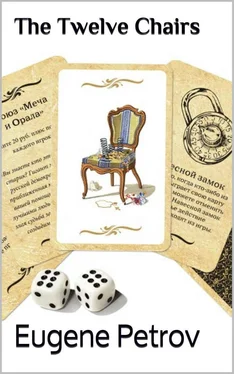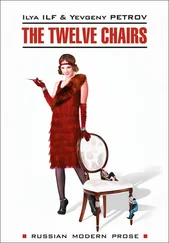Eugene Petrov - The Twelve Chairs
Здесь есть возможность читать онлайн «Eugene Petrov - The Twelve Chairs» весь текст электронной книги совершенно бесплатно (целиком полную версию без сокращений). В некоторых случаях можно слушать аудио, скачать через торрент в формате fb2 и присутствует краткое содержание. Год выпуска: 2013, Жанр: Юмористическая проза, на английском языке. Описание произведения, (предисловие) а так же отзывы посетителей доступны на портале библиотеки ЛибКат.
- Название:The Twelve Chairs
- Автор:
- Жанр:
- Год:2013
- ISBN:нет данных
- Рейтинг книги:5 / 5. Голосов: 1
-
Избранное:Добавить в избранное
- Отзывы:
-
Ваша оценка:
- 100
- 1
- 2
- 3
- 4
- 5
The Twelve Chairs: краткое содержание, описание и аннотация
Предлагаем к чтению аннотацию, описание, краткое содержание или предисловие (зависит от того, что написал сам автор книги «The Twelve Chairs»). Если вы не нашли необходимую информацию о книге — напишите в комментариях, мы постараемся отыскать её.
Find traces of a separate headset difficult and heroes face different adventures and troubles.
The Twelve Chairs — читать онлайн бесплатно полную книгу (весь текст) целиком
Ниже представлен текст книги, разбитый по страницам. Система сохранения места последней прочитанной страницы, позволяет с удобством читать онлайн бесплатно книгу «The Twelve Chairs», без необходимости каждый раз заново искать на чём Вы остановились. Поставьте закладку, и сможете в любой момент перейти на страницу, на которой закончили чтение.
Интервал:
Закладка:
Ippolit Matveyevich was wakened by the sound of waves dashing against
the porthole.
They reached Yalta in calm weather on an enervating sunny morning.
Having recovered from his seasickness, the marshal was standing at the prow
near the ship's bell with its embossed Old Slavonic lettering. Gay Yalta had
lined up its tiny stalls and floating restaurants along the shore. On the
quayside there were waiting carriages with velvet-covered seats and linen
awnings, motor-cars and buses belonging to the "Krymkurso" and "Crimean
Driver" societies. Brick-coloured girls twirled parasols and waved
kerchiefs.
The friends were the first to go ashore, on to the scorching
embankment. At the sight of the concessionaires, a citizen in a tussore-silk
suit dived out of the crowd of people meeting the ship and idle onlookers
and began walking quickly towards the exit to the dockyard. But too late.
The smooth operator's eagle eye had quickly recognized the silken citizen.
"Wait a moment, Vorobyaninov," cried Ostap.
And he raced off at such a pace that he caught up the silken citizen
about ten feet from the exit. He returned instantly with a hundred roubles.
"He wouldn't give me any more. Anyway, I didn't insist; otherwise he
won't be able to get home."
And indeed, at that very moment Kislarsky was fleeing in a bus for
Sebastopol, and from there went home to Stargorod by third class.
The concessionaires spent the whole day in the hotel sitting naked on
the floor and every few moments running under the shower in the bathroom.
But the water there was like warm weak tea. They could not escape from the
heat. It felt as though Yalta was just about to melt and flow into the sea.
Towards eight that evening the partners struggled into their red-hot
shoes, cursing all the chairs in the world, and went to the theatre.
The Marriage was being shown. Exhausted by the heat, Stepan almost fell
over while standing on his hands. Agafya ran along the wire, holding the
parasol marked "I want Podkolesin" in her dripping hands. All she really
wanted at that moment was a drink of ice water. The audience was thirsty,
too. For this reason and perhaps also because the sight of Stepan gorging a
pan of hot fried eggs was revolting, the performance did not go over.
The concessionaires were satisfied as soon as they saw that their
chair, together with three new rococo armchairs, was safe.
Hiding in one of the boxes, they patiently waited for the end of the
performance; it dragged on interminably. Then, finally, the audience left
and the actors hurried away to try to cool off. The theatre was empty except
for the shareholders in the concession. Every living thing had hurried out
into the street where fresh rain was, at last, falling fast.
"Follow me, Pussy," ordered Ostap. "Just in case, we're provincials who
couldn't find the exit."
They made their way on to the stage and, striking matches, though they
still collided with the hydraulic press, searched the whole stage.
The smooth operator ran up a staircase into the props room.
"Up here! "he called.
Waving his arms, Vorobyaninov raced upstairs.
"Do you see?" said Ostap, lighting a match.
Through the darkness showed the corner of a Hambs chair and part of the
parasol with the word "want".
"There it is! There is our past, present and future. Light a match,
Pussy, and I'll open it up."
Ostap dug into his pockets for the tools.
"Right," he said, reaching towards the chair. "Another match, marshal."
The match flared up, and then a strange thing happened. The chair gave
a jump and suddenly, before the very eyes of the amazed concessionaires,
disappeared through the floor.
"Mama!" cried Vorobyaninov, and went flying over to the wall, although
he had not the least desire to do so.
The window-panes came out with a crash and the parasol with the words
"I want Podkolesin" flew out of the window, towards the sea. Ostap lay on
the floor, pinned down by sheets of cardboard.
It was fourteen minutes past midnight. This was the first shock of the
great Crimean earthquake of 1927.
A severe earthquake, wreaking untold disaster throughout the peninsula,
had plucked the treasure from the hands of the concessionaires.
"Comrade Bender, what's happening?" cried Ippolit Matveyevich in
terror.
Ostap was beside himself. The earthquake had blocked his path. It was
the only time it had happened in his entire, extensive practice.
"What is it?" screech Vorobyaninov.
Screaming, ringing, and trampling feet could be heard from the street.
"We've got to get outside immediately before the wall caves in on us.
Quick! Give me your hand, softie."
They raced to the door. To their surprise, the Hambs chair was lying on
its back, undamaged, at the exit from the stage to the street. Growling like
a dog, Ippolit Matveyevich seized it in a death-grip.
"Give me the pliers," he shouted to Bender. "Don't be a stupid fool,"
gasped Ostap. "The ceiling is about to collapse, and you stand there going
out of your mind! Let's get out quickly."
"The pliers," snarled the crazed Vorobyaninov. "To hell with you.
Perish here with your chair, then. I value my life, if you don't."
With these words Ostap ran for the door. Ippolit Matveyevich picked up
the chair with a snarl and ran after him.
Hardly had they reached the middle of the street when the ground heaved
sickeningly under their feet; tiles came off the roof of the theatre, and
the spot where the concessionakes had just been standing was strewn with the
remains of the hydraulic press.
"Right, give me the chair now," said Bender coldly. "You're tired of
holding it, I see." "I won't!" screeched Ippolit Matveyevich. "What's this?
Mutiny aboard? Give me the chair, do you hear?"
"It's my chair," clucked Vorobyaninov, drowning the weeping, shouting
and crashing on all sides., "In that case, here's your reward, you old
goat!" And Ostap hit Vorobyaninov on the neck with his bronze fist. At that
moment a fire engine hurtled down the street and in the lights of its
headlamps Ippolit Matveyevich glimpsed such a terrifying expression on
Ostap's face that he instantly obeyed and gave up the chair.
"That's better," said Ostap, regaining his breath. "The mutiny has been
suppressed. Now, take the chair and follow me. You are responsible for the
state of the chair. The chair must be preserved even if there are ten
earthquakes. Do you understand?"
"Yes."
The whole night the concessionaires wandered about with the
panic-stricken crowds, unable to decide, like everyone else, whether or not
to enter the abandoned buildings, and expecting new shocks.
At dawn, when the terror had died down somewhat, Ostap selected a spot
near which there was no wall likely to collapse, or people likely to
interfere, and set about opening the chair.
The results of the autopsy staggered both of them-there was nothing in
the chair. The effect of the ordeal of the night and morning was 'too much
for Ippolit Matveyevich; he burst into a vicious, high-pitched cackle.
Immediately after this came the third shock. The ground heaved and
swallowed up the Hambs chair; its flowered pattern smiled at the sun that
was rising in a dusty sky.
Ippolit Matveyevich went down on all fours and, turning his haggard
face to the dark purple disc of the sun, began howling. The smooth operator
fainted as he listened to him. When he regained consciousness, he saw beside
Читать дальшеИнтервал:
Закладка:
Похожие книги на «The Twelve Chairs»
Представляем Вашему вниманию похожие книги на «The Twelve Chairs» списком для выбора. Мы отобрали схожую по названию и смыслу литературу в надежде предоставить читателям больше вариантов отыскать новые, интересные, ещё непрочитанные произведения.
Обсуждение, отзывы о книге «The Twelve Chairs» и просто собственные мнения читателей. Оставьте ваши комментарии, напишите, что Вы думаете о произведении, его смысле или главных героях. Укажите что конкретно понравилось, а что нет, и почему Вы так считаете.












